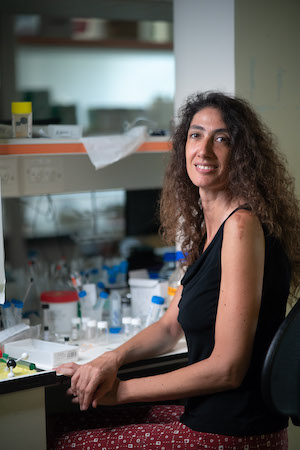Big Breakthrough in Alzheimer’s Research

Researchers at the Technion – Israel Institute of Technology, in collaboration with researchers from Le Centre National de la Recherche Scientifique (CNRS) in Toulouse, France, discovered an artificial molecule that may inhibit the development of Alzheimer’s disease. The molecule breaks down the toxic chemical complex Cu–Aβ, inhibiting the cell death that is thought to be related to Alzheimer’s.
The study was led by Professor Galia Maayan and doctoral student Anastasia Behar from the Schulich Faculty of Chemistry, in collaboration with Professor Christelle Hureau from the Laboratoire de Chimie de Coordination du CNRS.

Professor Galia Maayan
One of the causes of Alzheimer’s is the formation of free radicals that damage the brain cells. These are oxidizing agents formed, among other things, by Cu–Aβ, a complex of copper and amyloid beta. A process called chelation uses molecules to bind to the copper ions and break this substance down, preventing cell death and inhibiting the development of Alzheimer’s.
However, chelation is complex. Chelators must meet several critical chemical and kinetic conditions, including stability and resistance to oxidation-reduction reactions. It is also important that the chelator does not bind zinc ions during the copper extraction process, as they are also essential for neuron function.
The Technion and CNRS researchers have developed a new, artificial chelator that meets all these requirements. The chelator, P3, is a peptide-like water-soluble synthetic molecule that performs its task selectively. It strongly binds copper and forms the complex CuP3, extracting the copper from the amyloid. By doing so, it inhibits and even suppresses the formation of harmful oxidizing agents, without creating new oxidation processes.
The discovery is a huge step forward for Alzheimer’s research and opens up new, exciting frontiers in the treatment of such a debilitating disease.
More Health & Medicine stories

Technion Researchers Unite to Promote Healthy Aging
